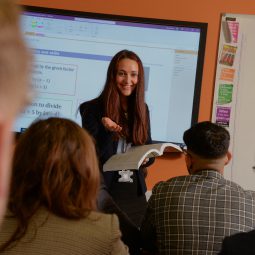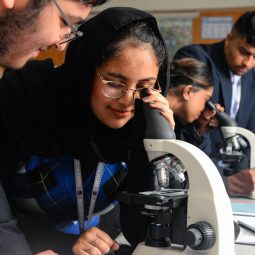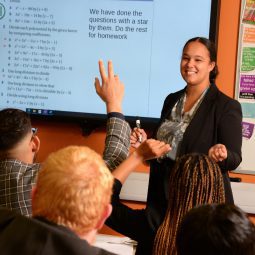The Year 12 Futures Pathway
Blue Coat students also take a co-curricular ‘Futures’ pathway, which offers personal development and increased breadth to extend your study beyond your 3 chosen subjects and give you the edge when it comes to higher education and professional applications. This offer includes:
Option 1: Extended Project Qualification
The Level 3 Extended Project Qualification (EPQ) gives you an opportunity to show academic commitment to your chosen subject and also to explore a topic you enjoy for its own sake. The EPQ aids the development of many key skills such as independent learning, research and critical thinking which are valued by both employers and universities. Many universities encourage students to carry out EPQs because they are excellent preparation for study in higher education.
The University of Cambridge say that:
“The EPQ is a great opportunity for students to explore something about their favourite subject in depth, to foster their own passion for that subject and to practise the kind of independent study they would be expected to undertake at university. It can also be a topic for discussion during interviews, giving us the chance to have an academic discussion with your student about a topic they are familiar with and excited about.” (https://www.pet.cam.ac.uk/information-schools)
The project process is supported by teaching which addresses the skills you will need for your project, and gives you a chance to develop your own ideas.
The Extended Project Qualification (EPQ) is all about exploring something you are passionate about in greater depth and translating this into extended essays and dissertations. The EPQ expands your research, evaluation and analysis skills, helping to develop many transferable skills including how to properly reference, which will be beneficent for university which exploits these skills. The course involves choosing a topic question of your interest and working more independently to investigate and analyse different perspectives and research sources, before applying your own perspective to weigh a myriad of arguments and counter-arguments in order to determine a substantiated conclusion and answer to your question. At the end of the project, there is a presentation in which you can share your findings and inspire your passion to an audience which also helps to build confidence.
I chose the EPQ , because I have an enthusiasm for medicine and liked that I could learn about real things that interested me without the boundaries of a specification holding back my investigation. This also played a big part in how much I enjoyed completing my project. EPQ opens your eyes to perspectives you may have never considered and the skillset you gain from the EPQ is so versatile as you cultivate on writing skills, research, reasoning, analysis and evaluation as well as time management, communication and organisation which is especially crucial to any course (and university) that is as independent as the EPQ.
If you are a hard-working, engaged person with enthusiasm or a love for learning and aren’t afraid of a challenge, then the EPQ would be an amazing opportunity for problem solving and innovation.
Option 2: Global Perspectives
The AS-level Global Perspectives course is designed to prepare young people to engage positively with a world where change is the only constant. By studying global issues, you will explore different and sometimes opposing perspectives, and develop transferable thinking and reasoning skills, plus research and communication skills. This key knowledge is particularly relevant for future lawyers, scientists, medics and academic researchers, and complements social sciences and humanities A-levels.
This course is skills rather than knowledge based. Students will be assessed on their thinking and reasoning skills focused mainly on analysing and evaluating arguments, evidence and contexts based around global topics. Global topics include the likes of – animal rights, changing identities, crime, health issues, impact of technology, scientific innovation, social inequality and many more.
This qualification is fully linear and will be assessed at the end of Year 12. There are 3 main components of assessment all of which are externally marked by Cambridge.
| Component | Task | Duration | Weighting | Type of Assessment |
|---|---|---|---|---|
| 1 | Written examination | 1 hour 30 minutes | 36% | Externally assessed |
| 2 | Essay | 1750 – 2000 words | 32% | Externally assessed |
| 3 | Team Project: Presentation, Reflective Paper | Maximum 10 minutes individual presentation and 800-word reflective paper | 32% | Externally assessed |
Global Perspectives is about extending evaluation and analysis skills and applying these to a variety of problems around the globe and being able to apply your own personal perspective about these issues. By gaining knowledge of these issues that cause disruption to the lives of many across the globe, and developing critical, analytical research skills, and problem-solving skills, you will be able to place your opinions, and weigh up all sides of arguments about real issues in the world. The course consists of a presentation, an essay, and also an exam. In the essay, you are allowed to choose a global issue, and are given the opportunity to research and talk about a subject that interests you, learning about people’s perspectives, and the counter arguments of these global issues.
I chose Global Perspectives because it helped me to develop transferable skills, such as referencing effectively and accurately, which will help when I go to university and require to utilise these skills. The skillset that you will learn in Global Perspectives can also be applied into areas in other subjects, as you will learn about different perspectives and will use research, reasoning, and communication skills, which are beneficial in all subjects. You will learn to deconstruct and reconstruct arguments, by doing detailed research and interrogating evidence, which will also be useful in other subjects, and, also at university.
If you are a person who enjoys learning and researching about issues that affect many people around the world, and somebody who would like to become more innovative for future challenges, confident in working with ideas, and engaged both socially and intellectually, then Global Perspectives will be an excellent choice for an AS level.
-Millie
Option 3: Core Maths
Level 3 Mathematical Studies (Core Maths) is designed for students who have achieved a grade 5 or above at GCSE. What you study is not purely theoretical or abstract; it can be applied on a day-to-day basis in work, study or life.
It is highly recommended that any student studying an A Levels such as Biology, Chemistry, Geography and Psychology, but who are not studying A Level Maths, study Core Maths, as it supports the increasing mathematical demand of these subjects.
Core Maths is designed to complement other A-Level qualifications such as the Sciences, Economics, Geography and Psychology. I feel that Core Maths highlights my mathematical capabilities within other subjects as there is often content crossover. For example, within Biology and Chemistry key components rooted in the Core Maths curriculum such as standard deviation, sampling, graphical analysis and correlation are frequently examined within the sciences.
This course also provides a clear answer to the question asked by every Mathematics student- “When will I use Maths in real life?” I personally believe that Core Maths should be mandatory for all 16–19-year-olds as aspects of the course for instance National insurance, Income Tax, Student loans, RPI, APR, AER and mortgages provide an insight into financial situations students will face in the future. I would recommend Core Maths for students who value a complementary course to assist with the quantitative Mathematical content in other subjects and the real-world application of Mathematics.
– Riaz
Option 4: A fourth subject of study
In a small number of cases some students may opt for a fourth subject at AS level as part of their Futures programme. This would most likely be to support a university application where an understanding of an additional field would be beneficial.
AS Subjects available to study as a fourth subject in Year 12:
- Further Mathematics
- Physics
- German
- Music
- French
I chose a forth subject to study, specifically Further Maths. This subject is all about extending your maths knowledge by expanding on topics from Maths A level as well as exploring new topics. The course is split into Pure maths and Applied maths, which consists of Discrete and Statistics.
I chose Further Maths as I wanted that extra challenge of understanding and applying trickier maths. The subject is fascinating and introduces many new and interesting concepts. As someone very interested in a degree in Physics or Engineering, Further Maths is helpful as these subjects involve a great deal of maths, since our fundamental understanding of the universe itself comes down to maths. Doing further maths has truly helped me recognise the elegance that exists only in a subject like maths. It has opened my eyes to the vast range of forms maths can take, from game theory to the Poisson distribution to matrices.
I would recommend the subject to a person who greatly enjoys maths and is looking for a challenge. The subject is difficult and requires some hard work in order to properly grasp new concepts, but it presents a great opportunity to further develop mathematical reasoning and problem-solving skills.
AS subjects are important as you still get to learn a full year worth of content of a subject and gain a lot of extra knowledge. An AS subject can also help develop your skills in organisation and time management. I have found that my AS has given me the opportunity to discover more about what aspects of STEM I like most, and has helped me use my time more effectively. And, of course, the biggest reason for doing an AS is a desire to learn, and a love for the subject you’re taking!
– Jiya
The Blue Coat Sixth Form is proud to be part of the Cranmer Education Trust
Cranmer Education Trust is a company limited by guarantee and an exempt charity registered in England. Company registration number: 07687709. Registered Office: Cranmer Education Trust, c/o The Blue Coat School, Egerton Street, Oldham OL1 3SQ. The website address is www.cranmereducationtrust.com and the phone number 0161 785 5082.









